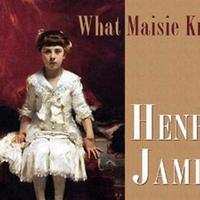Chapter XIV
Mrs Beale fairly swooped upon her and the effect of the whole hour was to show the child how much, how quite formidably indeed, after all, she was loved. This was the more the case as her stepmother, so changed—in the very manner of her mother—that she really struck her as a new acquaintance, somehow recalled more familiarity than Maisie could feel. A rich strong expressive affection in short pounced upon her in the shape of a handsomer, ampler, older Mrs. Beale. It was like making a fine friend, and they hadn't been a minute together before she felt elated at the way she had met the choice imposed on her in the cab. There was a whole future in the combination of Mrs. Beale's beauty and Mrs. Beale's hug. She seemed to Maisie charming to behold, and also to have no connexion at all with anybody who had once mended underclothing and had meals in the nursery. The child knew one of her father's wives was a woman of fashion, but she had always dimly made a distinction, not applying that epithet without reserve to the other. Mrs. Beale had since their separation acquired a conspicuous right to it, and Maisie's first flush of response to her present delight coloured all her splendour with meanings that this time were sweet. She had told Sir Claude she was afraid of the lady in the Regent's Park; but she had confidence enough to break on the spot, into the frankest appreciation. "Why, aren't you beautiful? Isn't she beautiful, Sir Claude, isn't she?" "The handsomest woman in London, simply," Sir Claude gallantly replied. "Just as sure as you're the best little girl!" Well, the handsomest woman in London gave herself up, with tender lustrous looks and every demonstration of fondness, to a happiness at last clutched again. There was almost as vivid a bloom in her maturity as in mamma's, and it took her but a short time to give her little friend an impression of positive power—an impression that seemed to begin like a long bright day. This was a perception on Maisie's part that neither mamma, nor Sir Claude, nor Mrs. Wix, with their immense and so varied respective attractions, had exactly kindled, and that made an immediate difference when the talk, as it promptly did, began to turn to her father. Oh yes, Mr. Farange was a complication, but she saw now that he wouldn't be one for his daughter. For Mrs. Beale certainly he was an immense one—she speedily made known as much; but Mrs. Beale from this moment presented herself to Maisie as a person to whom a great gift had come. The great gift was just for handling complications. Maisie felt how little she made of them when, after she had dropped to Sir Claude some recall of a previous meeting, he made answer, with a sound of consternation and yet an air of relief, that he had denied to their companion their having, since the day he came for her, seen each other till that moment.
Mrs. Beale could but vaguely pity it. "Why did you do anything so silly?" "To protect your reputation." "From Maisie?" Mrs. Beale was much amused. "My reputation with Maisie is too good to suffer." "But you believed me, you rascal, didn't you?" Sir Claude asked of the child.
She looked at him; she smiled. "Her reputation did suffer. I discovered you had been here." He was not too chagrined to laugh. "The way, my dear, you talk of that sort of thing!" "How should she talk," Mrs. Beale wanted to know, "after all this wretched time with her mother?" "It was not mamma who told me," Maisie explained. "It was only Mrs. Wix." She was hesitating whether to bring out before Sir Claude the source of Mrs. Wix's information; but Mrs. Beale, addressing the young man, showed the vanity of scruples. "Do you know that preposterous person came to see me a day or two ago?—when I told her I had seen you repeatedly." Sir Claude, for once in a way, was disconcerted. "The old cat! She never told me. Then you thought I had lied?"

